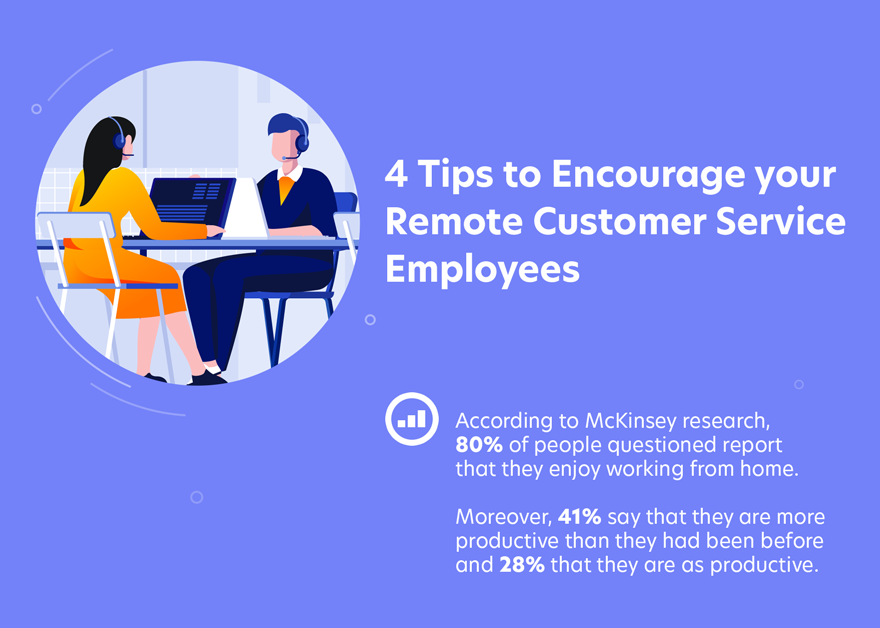During COVID-19 pandemic almost all businesses around the globe started migrating to virtual offices and offering their employees to work remotely. In fact, 88% of organizations have encouraged or required their employees to work from home and 91% of teams in Asia Pacific have implemented ‘work from home’ arrangements since the outbreak. According to McKinsey research, 80% of people questioned report that they enjoy working from home. Moreover, 41% say that they are more productive than they had been before and 28% that they are as productive.
However, still there are questions and challenges which organizations face. Before the pandemic offices were critical to win talents, show better productivity and develop company culture. Even bearing in mind the fact that 41% were more productive while working remotely, organizations doubt if it will be possible to keep the same level of productivity, mentorship and talents development.
Not surprisingly customer service turned out to be the hardest-hit department during the pandemic. The lack of proper infrastructure employees used to enjoy in their offices, absence of managers’ support and lots of Covid-related calls led to high-effort interactions. This resulted in lower sales level and employee turnover. These 4 tactics will help organizations better navigate this difficult situation and encourage remote customer service employees.
Create convenient virtual office environment
While working from home for the first time customer service reps found themselves without the infrastructure, reliable phone and Internet connection as well as support from managers. As a result this increased the number of high-effort interactions, hold times and escalations with lower percent of cross-sell and up-sell. Thus having the right tools at their fingertips will help your remote customer service employees better assist customers.
Coach and monitor employees virtually
With all reps working from home managers also need to get used to this situation and find the best way to monitor and train their agents without being obtrusive. It is important to remember that loyalty is driven by how well a company solves issues and delivers on its basic promises rather than how their reps can wow customers and provide spectacular experience. Effortless experience should be priority under such circumstances. However, proper training and monitoring should also take place:
- Check chat transcripts to see how live chat sessions were going and send your comments to agents
- Ask reps open-ended questions about their calls and problems they have been experiencing
- Schedule regular individual video conferences to talk to your team members, discuss issues and assist with them
- Schedule weekly brain storms with your team to discuss most interesting cases and most common issues.
Use collaboration tools to improve teamwork
Proper tools for team collaboration will help you better communicate with your team and create productive working environment. You will have an ability to schedule meetings and provide assistance during customer service shifts, discuss most common issues with team members and give access to valuable files and information. With such tools migration to virtual office will be less painful for those reps who used to work in an office and closely communicate with managers and co-workers.
Arm your remote customer service employees with techniques that help reduce customer frustration
This is not about chat or phone etiquette. This is about handling customers in stressful situations when it is important to use the right words to respond to a complaint or greet the returning customer. By hiding behind company policies which were developed before the pandemic most reps make an already difficult situation worse. Here are some steps you can follow to reduce such situations:
- Revise company policies and update to reflect the current reality
- Teach your reps to use positive language
- Reinforce collaboration between departments to avoid chats and calls redirection
- Reduce customer effort by developing proper communication soft skills
COVID-19 pandemic forced customer service employees and managers work under pressure and show how quickly they can adjust to new circumstances, policies and environment. However, by focusing on the right skills and making effortless customer experience your main priority, you will see that you can succeed even during the pandemic.
- Should you use emojis at work? A practical guide - June 17, 2025
- How to streamline your customer service with ChatGPT - May 28, 2025
- How to use real-time translation to chat with customers - April 18, 2025

